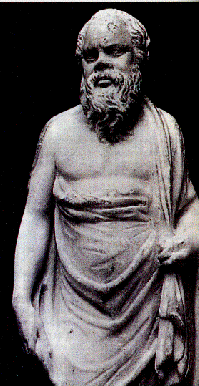

 |
 |
|||||
Socrates

TIt is here the history and the largest's thought and more important philosopher of the history of the western philosophy: Socrates. Born in Athens, Greece, in the year of 470 B.C., Sócrates lived until the year of 399 B.C. He was son of Sofronisco (sculptor) and of midwife Fenareta, such philosopher is by himself a philosophical problem. That because he never wrote an alone word, what was not common in its time, and it was against the well-known quibblers (wandering wise persons that collected to teach to the people), since Socrates thought the knowledge, the wisdom, the discernment, they didn't have price, because he was considered a philosopher, word in Greek that means lover of the wisdom. Thus, he simply loved the knowledge, and, thus, he looked for it for love, and not to get money or to do fortune.
It is possible to just know Socrates' life for the documents writings for its main pupil, Plato, that wrote several Dialogues where Socrates' illustration appears.
Physically, Socrates was not considered nor a little beautiful, since it was low, fat and its eyes seemed that will jump outside of the orbits. But Socrates' interior compensated yours ugliness, because there is not anything more wonderful than the thoughts and philosophical reflections than such illustration brought even us. One of Socrates' largest characteristics was the Art of the Dialogue. That because he refused to teach the people as a traditional teacher. He, actually, dialogued with the people, giving the impression that wanted to learn with its more speaker than the own speaker wanted to learn with him. In the beginning of a chat of those, Sócrates asked several questions to its speaker, faking not to know anything, if going by ignoramus or for fool (that today is known as socrates' irony). With such questions and attitudes, he didn't teach, but yes he did with that its speaker contemplated on its knowledge, it used the reason and he found the weak points of its thought. As those chats happened in open places, as squares to the markets, to dialogue with Socrates, a lot of times it was been to expose to the ridicule in front of the society Athenian.
In that way, Socrates said that had its mother's same profession. It is quite so, Socrates was considered a accoucheur, not accoucheur of babies, but a accoucheur of IDEAS. Today such a practice was well-known with Maieutic, where Socrates made its speakers they to contemplate and they give the light to the ideas that were latent in its souls and he affirmed that the knowledge was a natural thing and that needed to be placed outside of the individual through the use of the reason.
Today, one of the more acquaintances and more important thoughts of Socrates are the famous " I know that nothing knows ", where Socrates determined yours own ignorance and he affirmed that the true wise person is that that knows that nothing knows, it is that that is aware of its ignorance.
All those attitudes and thoughts of Socrates ended up inconveniencing the powerful of Athens, that ended up accusing him of " honoring other gods that not the one of the city " for using the reason as measure of the things, and of " corrupting the youth ". Thus, he was judged and convict to the death, tends to drink a hemlock chalice. But Socrates coulded not very well to have asked mercy or same to have escaped from Athens, but, in moment no Socrates thought of going against its own thoughts, considering its more important conscience than its life. In 399 B.C., Sócrates drank the poison and he died with its friends and pupils to its circuit.
©Copyright by Carpe Diem Filosofia ®
Todos os direitos reservados a
Carpe Diem Filosofia ®
Brazil